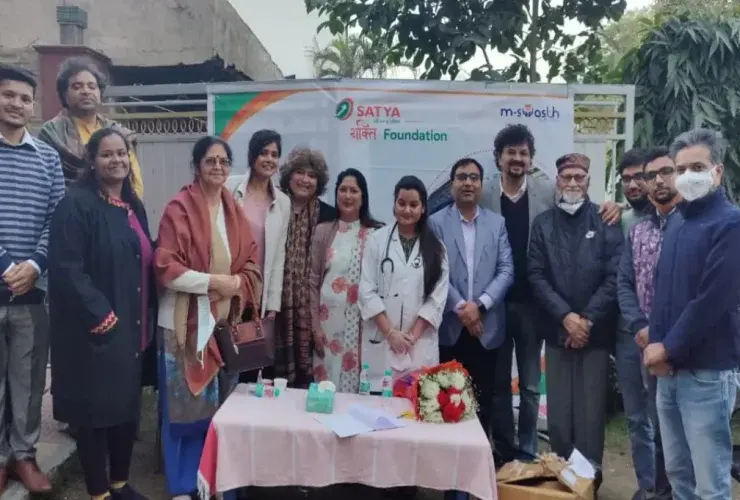

India, with its vast population and diverse socio-economic conditions, faces many challenges in providing equal opportunities for education and healthcare. While the government implements several welfare programs, Non-Profit Organizations, NPO in India have emerged as critical drivers of change. These organizations bridge gaps by reaching underserved communities, ensuring that children receive quality education and that families have access to basic healthcare services.

Education and health are the foundation of a thriving society. Unfortunately, millions of children in rural and urban slum areas are still deprived of proper schooling, while basic healthcare is often inaccessible or unaffordable. In this context, NPOs play a transformative role by offering holistic, community-focused solutions that empower people and improve their quality of life.
An NPO (Non-Profit Organization) operates with the primary objective of serving society rather than generating profit. These organizations are driven by the mission to bring positive changes in communities through long-term, sustainable initiatives. They partner with volunteers, corporates, and government bodies to amplify their efforts.
NPOs working in education and health focus on:
Providing free or affordable education to children from underprivileged backgrounds.
Creating healthcare awareness and offering preventive healthcare services.
Conducting skill development programs to improve employability.
Providing nutrition and mental health support for children and families.
Education and health go hand-in-hand in building a better future. Without education, individuals cannot break free from the cycle of poverty, and without good health, even the most talented minds struggle to realize their potential. The best NPOs in India understand this connection and work on both fronts.
Education ensures that children gain knowledge, life skills, and confidence to pursue better opportunities.
Healthcare improves life expectancy, reduces infant mortality, and ensures that families lead healthy lives.
By addressing these two areas simultaneously, NPOs lay a strong foundation for overall community development.
Organizations like Smile Foundation and CRY (Child Rights and You) have set up schools or partner with local schools to provide free education to children who cannot afford tuition fees.
With the rise of technology, many NPOs now provide digital learning kits and online classes to bridge the education gap, particularly in rural areas.
Some NPOs offer skill development programs for young adults and women, focusing on tailoring, handicrafts, and IT courses to create employment opportunities.
Scholarships for meritorious but economically challenged students are also part of many NPO initiatives, ensuring that financial constraints do not hinder education.
Organizations like CRY and Pratham focus on creating awareness about the importance of education, advocating against child labor, and ensuring every child is enrolled in school.
Many NPOs, including Smile Foundation’s Smile on Wheels, deploy mobile health vans that reach remote villages to provide basic healthcare check-ups, medicines, and diagnostic services.
Malnutrition is still a major challenge in India. NPOs work on providing balanced meals and nutritional supplements to children and pregnant women.
Awareness drives about hygiene, sanitation, vaccination, and disease prevention are a focus area for NPOs.
Some progressive organizations have started initiatives for mental health awareness, providing counseling for students and families facing emotional challenges.
NPOs collaborate with hospitals and clinics to provide affordable treatments, organize free medical camps, and distribute medicines to low-income families.
Several organizations have made a remarkable impact through their education and health initiatives. Some of the leading NPOs in India include:
Smile Foundation works across the country, focusing on education for underprivileged children and healthcare services for rural areas. Their programs like Mission Education and Smile on Wheels are widely recognized.
Goonj is known for its unique approach to rural development and disaster relief. While their primary focus is on resource management, they also contribute to health and hygiene awareness.
Pratham is a pioneer in improving educational quality for children across India. Their Annual Status of Education Report (ASER) has become a benchmark for assessing literacy levels.
CRY has been a strong advocate for children’s rights, ensuring they have access to education, healthcare, and protection from exploitation.
Teach For India works to close the educational gap by placing dedicated educators in schools for underprivileged children.
While primarily focused on elderly care, HelpAge India also runs healthcare programs for senior citizens and underserved communities.
The combined efforts of NPOs have led to measurable improvements:
Literacy Rates: Community-based education programs have improved literacy levels among children in urban slums and rural areas.
Health Awareness: Mobile healthcare units have reduced the incidence of preventable diseases.
Nutrition: Midday meal programs have increased school attendance while ensuring children get proper nutrition.
Women Empowerment: Through healthcare and education, women are becoming more independent and better equipped to provide for their families.
Despite their successes, NPOs face several challenges:
Funding Limitations: Many NPOs rely on donations and corporate CSR, which can fluctuate.
Infrastructure Gaps: Remote areas still lack proper facilities for education and healthcare.
Awareness and Outreach: Ensuring that people understand the importance of education and healthcare remains a hurdle.
Policy and Regulation: Compliance with government norms often requires additional resources and expertise.
As an individual or business, you can contribute to their mission in various ways:
Donations: Regular contributions help fund their programs.
Volunteering: Teaching children, organizing health camps, or conducting awareness drives.
Sponsorship: Sponsor the education of a child or healthcare for a family.
Corporate Partnerships: Companies can partner through CSR programs to support large-scale initiatives.
The future of NPOs in India lies in leveraging technology to expand their reach. Digital classrooms, online fundraising, telemedicine, and e-learning platforms will become increasingly important. Moreover, collaborations between NPOs, corporates, and government bodies will ensure stronger and more sustainable results.